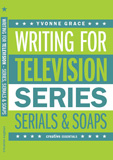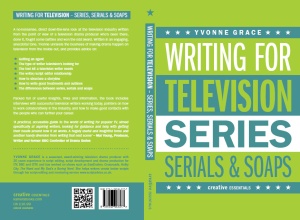Via my Script Consultancy Business http://www.scriptadvice.co.uk I work with a lot of writers, mainly via email or Skype, from my desk here at Script Advice Towers aka My House. I also have a child to raise and to make sure he doesn’t become feral and a house to run. Not as many plates as some professional parents, but still a plate juggling exercise non the less.
Just as well that I am a goal orientated person. One who needs deadlines and sights to be firmly set on the target in hand, otherwise, completely zero gets done and absolutely nothing is achieved.
Writers and those that work from home beware, The Island of Self-Loathing is not far away and there, on the shore, lie the bulky forms of Laziness, Procrastination and Indolence, shading themselves under the ominous shadow of Day Time Television. Not a nice place. To be avoided at all costs.
I thrive on Lists. Lists are good. Lovely Lists.
If I don’t make a list, then the following scenario can, in extremis, unfurl.
7am – Woke by sense of a warm presence in my room. Unstick eye to find son 2 cm from my face, holding a Lego policeman. ‘He says get up or else’. I do.
7.30am – Breakfast on the go. Must make a list for the day. Stand in bare feet on sharp edge of Lego brick stuck in the rug. Swear. Try to hide the swear, by sneaky segue into a sing along to Ben and Holly’s Little Kingdom on the telly.
8am – Finally the threats have worked and son is upstairs, getting into his uniform. Must make a list – got so much to get done today. Son can not find his school Polo shirt. I know where they are. In the dirty laundry basket. Assess the level of dirt/disease of Polo shirts. Chose one that sports Marmite stain but unfeasibly enough, under the arm pit. Hope it won’t present as Mange or worse.
8.15am – Wash, dress, attempt to apply mascara in 5 mins flat. Manage it. Although I am aware I have the appearance of Malcolm McDowell in ‘A Clockwork Orange’ due to the over application of one eye and the under of the other.
8.20am – School bag on his back, shoes on his feet, jettison Son out of the house, remember car keys just in time before slamming the door. ‘Why is my bag so light?’ Son’s question reminds me I haven’t made his packed lunch. Fly back into the house and make sandwiches, find a yoghurt, some fruit and a biscuit and then spend another agonised five minutes trying to find his Darth Vader Sandwich box. It’s in his school bag. Empty except for the wrappers of yesterday’s packed lunch; made without guilt and more time.
8.45am – I drive up to the school 10 minutes later than yesterday, that day when the sun shone and I was a perfectly sane, balanced working mum of one. So now, today, the day from Hell when I look like a Droog and son’s shirt smells of 3 day old Marmite, I can’t find a parking space. Find one – it’s small. More a gap between cars rather than an actual space. Learning to drive in London finally paid off. I park within a micro particle of the bumper in front and the radiator behind. No way can I open the door. Wedged between a garden fence and a hedge. The hedge being more porous, encourage son to clamber over the gear stick and out the driver’s side.
8.55am – Just before school gates shut, son waves goodbye and runs past Head Mistress with Privet in his hair.
9am – Essential food shopping. Get distracted by non essential shopping. Get talking to friendly mum I know from school run. We both buy a jug we don’t need.
10am – Home to make my list. Do not make my list but spend 2 hours on Social Media Networks. Some of it productive. A lot not. But I have seen some engaging pictures of disastrous weddings and a Meerkat that looks like Nigel Farage.
Lunch. Each mouthful tastes like sand. I truly hate myself.
1pm – I make a list. That feels very good. I put the kettle on to celebrate.
2pm – 3pm – I work. Hard and productively.
3.10pm – Flying out of the door, I am determined not to be late for son’s school pick up.
Son is pleased to see me. I am not late. I have done some work. I am ok. I can do more when we get home and we neither of us care I have Privet in my hair.
So, to avoid sailing one’s rickety craft towards Self Loathing Island, here is my rough guide to a smooth passage and productivity on a daily basis.
1/ Proportion off your day.
Write this stuff down. Holding a piece of paper with your tasks and your responsibilities outlined in your own writing, honestly has a calming effect. Then, when you have achieved one of these things, you get to tick it off and feel a sense of personal achievement.
2/ Be Flexible.
Some of the day is child related, some work. Sometimes work has to over lap child duties. That’s why DVD’s were invented. I used to feel guilty about letting my son watch a programme, or play Super Mario on the laptop while I beavered away on my computer, but not any more. I have to be flexible in my work/mum rota, otherwise I will snap and that only serves my Osteopath.
3/ Tea is good.
Take a break regularly through the day.
4/ Do watch the clock.
Apply a rough time frame to each task and try to stick to it. Leave enough time to get from A to B if you have to leave your desk.
5/ Leave your work in a good place so you can come back to it without dread and the threat of distraction.
6/ Ease up on yourself.
You can do a lot if you stick to a time frame and an achievable number of tasks in the day.
7/ Only manageable bite-sized chunks of Social Media Time is allowed.
I encourage my writer clients and members of my writer’s group on Facebook Script Advice Writer’s Room; https://www.facebook.com/groups/scriptadvice/?fref=nf to use Social Media to get in touch and stay in touch with like-minded types and those actually working in the industry. But do this in very strict time allocated bursts either throughout the day (to mix things up a little) or in sections of time in the morning or the afternoon. Never over do the internet trawling thing. It literally eats your time. You will be cast away on that flippin’ island before you know it.
Sizzle or Substance? Creativity v Commercialism in Series Television Drama – is my session for the London Screenwriters’ Festival in October. I would love to see you there. Come and hear me, Waking the Dead creator and Bafta winning writer Barbara Machin and Executive Producer of Holby City Simon Harper talk all things story related for series television.
http://www.londonscreenwritersfestival.com/whats-on/sessions/sizzle-or-substance-commercialism-vs-creativity-in-tv-drama-series
My book, Writing for Television, Series, Serials and Soaps is getting five star reviews and lots of nice comments on Amazon and Twitter. Follow me there https://twitter.com/YVONNEGRACE1 and buy your copy here http://www.amazon.co.uk/Writing-Television-Yvonne-Grace/dp/1843443376/ref=sr_1_7?s=books&ie=UTF8&qid=1400840643&sr=1-7&keywords=writing+for+television













 HAPPY NEW YEAR FROM SCRIPT ADVICE TOWERS….
HAPPY NEW YEAR FROM SCRIPT ADVICE TOWERS….